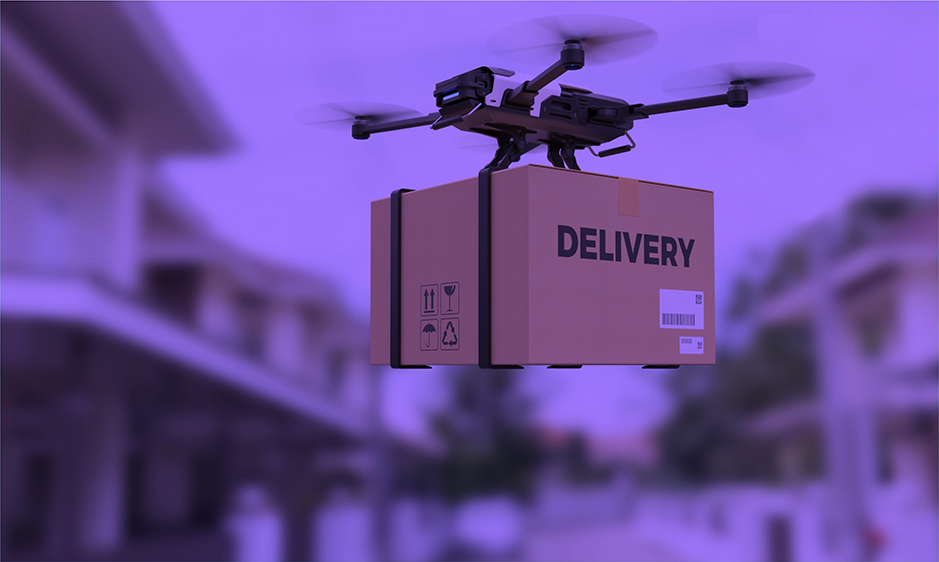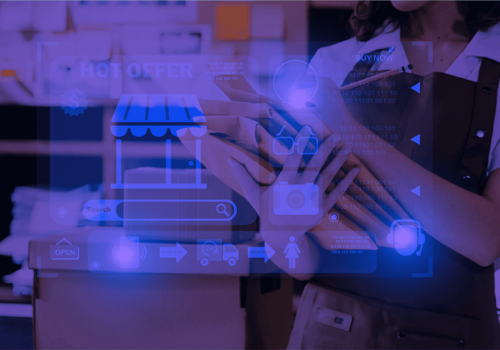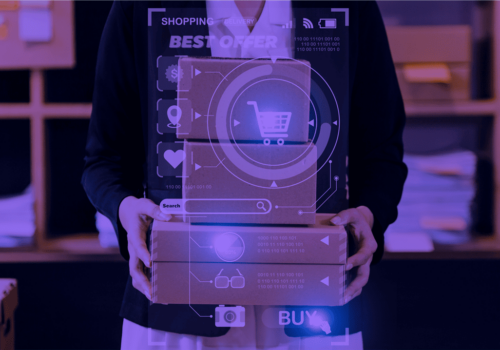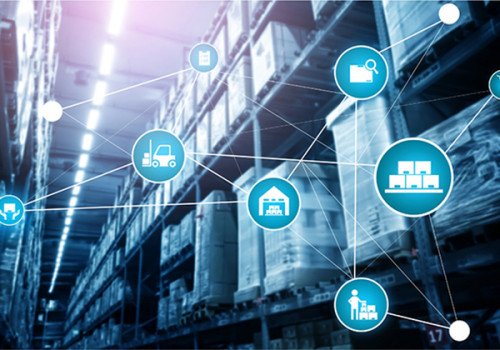An effective supply chain means getting things to customers quickly and keeping up with their needs. It won’t be wrong to cite supply chain management as the heart of a business since it directly and indirectly impacts business operations. The modern reach of retail industry requires supply chain logistics to optimize, evolve and apply the latest Green Technology.
A green supply chain, also known as a sustainable or eco-friendly supply chain, focuses on minimizing environmental impact throughout the entire product lifecycle. This includes sourcing raw materials responsibly, reducing energy consumption in manufacturing, optimizing transportation logistics for lower emissions, and promoting the recycling or eco-friendly disposal of products at the end of their life cycle. The goal is to integrate environment-friendly practices into every stage of the supply chain to support ecological sustainability.
What is Green Supply Chain?
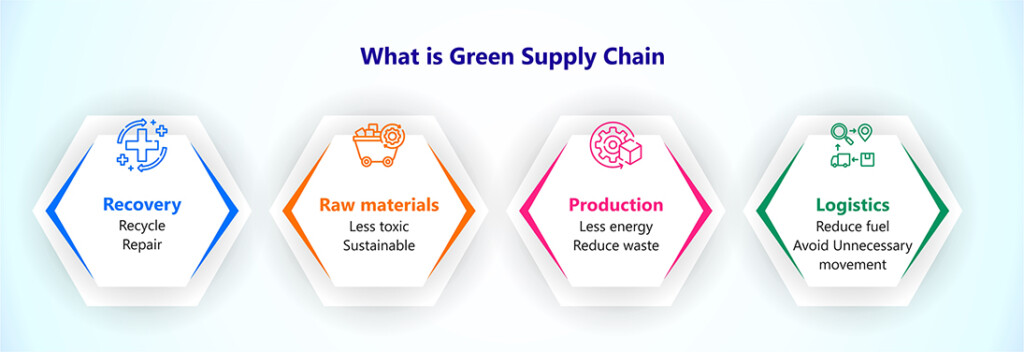
By adopting green technologies and minimizing power consumption, companies can cut unnecessary expenses and leverage government subsidies aimed at promoting environmental friendliness. In this blog, we will pick one particular form of green technology that’s being increasingly used by the freight and logistics industry, i.e. Unmanned Aerial Vehicles (UAVs) or drones. Initially used mostly for military activities, drones are quickly expanding into the retail industry.
Drones are increasingly finding their wings in the retail industry, delivering innovative solutions to enhance efficiency and customer experiences. Within logistics, drones are employed for last-mile deliveries, swiftly transporting packages through the skies for quicker delivery and lower carbon emissions. Their utility is expanding to include warehouse operations such as inventory management, locating misplaced items, and facilitating the shipping of goods between distribution centers, stores, and for last-mile delivery.
Key Drivers Behind Drones Becoming Retail's New Allies
Mordor Intelligence, in its Drone Delivery Market Size & Share Analysis – Growth Trends & Forecasts (2024 – 2029) report, predicts that the Delivery Drones Market size is estimated at USD 2.81 billion in 2024, and is expected to reach USD 16.63 billion by 2029, growing at a CAGR of 42.65% during 2024-2029. Factors such as the rise of e-commerce, increase in demand for faster delivery & improved efficiency in freight transportation, and a surge in environmental compliance to address concerns related to CO2 emissions and carbon footprint has boosted the growth of the cargo drone market. The Truck–Drone collaborations are using information effectively to execute deliveries by air to multiple destinations.
Faster Deliveries – Drones enable swift and timely deliveries, reducing the time it takes to transport products from distribution centres to customers’ doorsteps. This speed is especially crucial for meeting the demands of e-commerce and same-day delivery services.
Cost Savings – Drones can potentially reduce delivery costs compared to traditional methods. They require less manpower for certain tasks, have lower fuel expenses, and can optimize delivery routes, contributing to overall cost savings for retailers.
Improved Customer Experience – Faster and more reliable deliveries contribute to an enhanced customer experience. Drones offer the potential for quick order fulfilment, reducing wait times and improving overall customer satisfaction.
Innovative Marketing and Branding – Retailers can leverage drone technology for innovative marketing campaigns and promotional activities. Aerial views of products, interactive experiences, and drone-based advertising can capture consumer attention and create a unique brand image.
Security and Surveillance – Drones can be used for monitoring and securing retail premises, helping to prevent theft, vandalism, and unauthorized access. They provide an additional layer of security, especially in large retail spaces or warehouses.
Data Collection and Analytics – Drones equipped with sensors and cameras can collect valuable data for retailers. This data can be used for analytics, gaining insights into customer behaviour, foot traffic patterns, and store layouts to optimize merchandising strategies.
Rapid Response in Emergencies – Drones can be instrumental in responding to emergencies or natural disasters by delivering essential supplies, assessing damage, or providing situational awareness. This capability is crucial for retailers operating in diverse geographical locations.
Cost Savings and Beyond: The Business Advantages of Drones in Retail
Retailers are also leveraging drones for aerial surveillance to monitor stock levels in large warehouses. In-store, drones equipped with cameras can capture dynamic shots for marketing or promotional content. These unmanned aerial vehicles are revolutionizing the retail landscape, providing cost-effective, agile solutions for tasks ranging from delivery to inventory control. Drones are transforming the final leg of the delivery process. By replacing traditional delivery vehicles with drones, retailers can significantly reduce carbon emissions associated with transportation. Companies like Amazon and UPS have already started experimenting with drone deliveries, offering quicker and cleaner alternatives.
Drones equipped with advanced cameras and sensors can efficiently monitor and manage inventory levels in large warehouses. This not only reduces the need for human labour but also minimizes energy consumption by optimizing storage space. In case of retail businesses involved in the food industry; drones can be employed to monitor agricultural practices. From assessing crop health to managing irrigation, drones provide valuable insights that help retailers make environmentally conscious decisions.
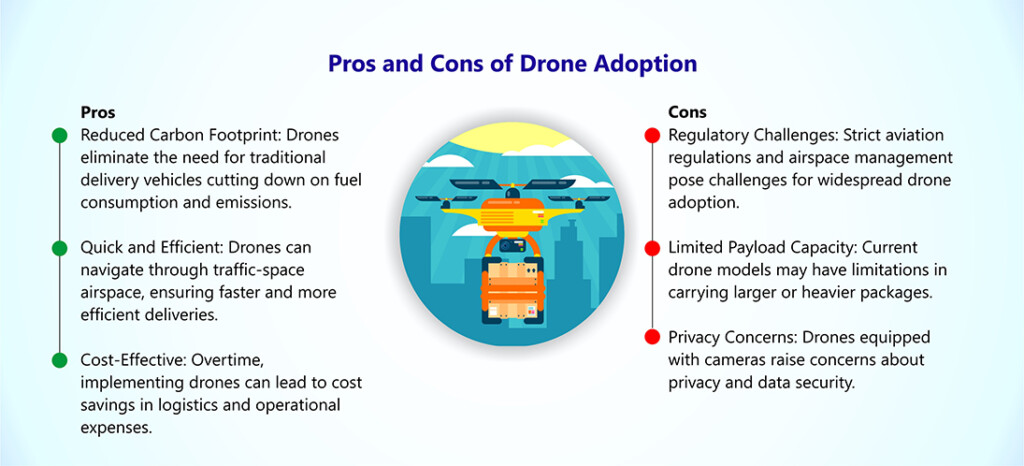
Clearing the Air: Challenges That Retailers Face in Embracing Drone Technology
Although the integration of drones in retail is on the rise, various challenges hinder their widespread adoption. Here are some of them:
Safety Concerns: Safety issues related to collisions, especially in crowded spaces, are a major reason. Ensuring the safety of people and property is a top priority for both regulatory authorities and retailers.
Battery Life and Range: Limited battery life and range are common challenges for drones. Overcoming these limitations is crucial for enabling drones to cover larger areas and operate for extended periods, especially in retail environments with high demand.
Technological Challenges: Technological challenges, including the need for advanced obstacle avoidance systems, accurate navigation, and reliable communication systems, are areas that need further development to enhance the effectiveness and safety of drone operations.
Operational Costs: The initial investment and ongoing operational costs associated with implementing and maintaining a drone fleet worry retailer. Calculating the return on investment and justifying the costs could be challenging, especially for smaller businesses.
Public Perception: Public acceptance of drones in everyday life and commercial applications plays a role. Overcoming negative perceptions or fears associated with drones required education and outreach efforts.
Weather Conditions: Adverse weather conditions, such as rain, wind, or snow, can affect the performance and reliability of drones. Drones that can operate in various weather conditions will be preferred.
Lack of Standardization: The absence of standardized protocols and technologies in the drone industry can hinder interoperability and create compatibility issues between different drone systems.
Green Skies Ahead: Drones Transforming Retail for Sustainable Futures
In the pursuit of sustainable practices, retailers find drones to be a promising avenue for reshaping the industry. By embracing these flying marvels, the retail sector can not only enhance operational efficiency but also contributes to building a greener and more eco-conscious future. The challenges may be significant, but the potential benefits for both retailers and the environment make the journey worthwhile. As technology continues to evolve, we can expect drones to play an increasingly pivotal role in shaping the retail industry’s commitment to sustainability.
The future of drones in the retail industry looks promising, with ongoing advancements aiming to address current limitations. Innovations in battery technology, AI-powered navigation, and increased collaboration between industry stakeholders and regulators are anticipated to propel the adoption of drones.
Interested to know use cases where drones have strong adoptability and what we at Acuver are engineering? Get in touch with our engineering experts today.
Author: Aswathnarayana A
Subscribe to our blog and stay updated!
Share This Story, Choose Your Platform!


